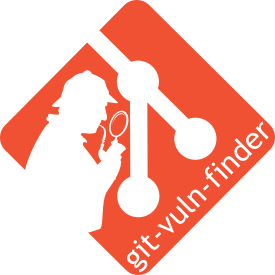git-vuln-finder
Finding potential software vulnerabilities from git commit messages. The output format is a JSON with the associated commit which could contain a fix regarding a software vulnerability. The search is based on a set of regular expressions against the commit messages only. If CVE IDs are present, those are added automatically in the output.
Requirements
- jq (
sudo apt install jq)
Installation
Use it as a library
git-vuln-finder can be install with poetry. If you don't have poetry installed, you can do the following curl -sSL https://raw.githubusercontent.com/python-poetry/poetry/master/get-poetry.py | python.
$ poetry install
$ poetry shell
$ git-vuln-finder -hYou can also use pip. Then just import it:
Python 3.8.0 (default, Dec 11 2019, 21:43:13)
[GCC 9.2.1 20191008] on linux
Type "help", "copyright", "credits" or "license" for more information.
>>> from git_vuln_finder import find
>>> all_potential_vulnerabilities, all_cve_found, found = find("~/git/curl")
>>> [commit for commit, summary in all_potential_vulnerabilities.items() if summary['state'] == 'cve-assigned']
['9069838b30fb3b48af0123e39f664cea683254a5', 'facb0e4662415b5f28163e853dc6742ac5fafb3d',
... snap ...
'8a75dbeb2305297640453029b7905ef51b87e8dd', '1dc43de0dccc2ea7da6dddb7b98f8d7dcf323914', '192c4f788d48f82c03e9cef40013f34370e90737', '2eb8dcf26cb37f09cffe26909a646e702dbcab66', 'fa1ae0abcde5df8d0b3283299e3f246bedf7692c', 'c11c30a8c8d727dcf5634fa0cc6ee0b4b77ddc3d', '75ca568fa1c19de4c5358fed246686de8467c238', 'a20daf90e358c1476a325ea665d533f7a27e3364', '042cc1f69ec0878f542667cb684378869f859911']
>>> print(json.dumps(all_potential_vulnerabilities['9069838b30fb3b48af0123e39f664cea683254a5'], sort_keys=True, indent=4, separators=(",", ": ")))
{
"author": "Daniel Stenberg",
"author-email": "[email protected]",
"authored_date": 1567544372,
"branches": [
"master"
],
"commit-id": "9069838b30fb3b48af0123e39f664cea683254a5",
"committed_date": 1568009674,
"cve": [
"CVE-2019-5481",
"CVE-2019-5481"
],
"language": "en",
"message": "security:read_data fix bad realloc()\n\n... that could end up a double-free\n\nCVE-2019-5481\nBug: https://curl.haxx.se/docs/CVE-2019-5481.html\n",
"origin": "https://github.com/curl/curl.git",
"origin-github-api": "https://api.github.com/repos///github.com/curl/curl/commits/9069838b30fb3b48af0123e39f664cea683254a5",
"pattern-matches": [
"double-free"
],
"pattern-selected": "(?i)(double[-| ]free|buffer overflow|double free|race[-| ]condition)",
"state": "cve-assigned",
"stats": {
"deletions": 4,
"files": 1,
"insertions": 2,
"lines": 6
},
"summary": "security:read_data fix bad realloc()",
"tags": []
}Use it as a command line tool
$ pipx install git-vuln-finder
$ git-vuln-finder --helpYou can also use pip.
pipx installs scripts (system wide available) provided by Python packages
into separate virtualenvs to shield them from your system and each other.
Usage
usage: git-vuln-finder [-h] [-v] [-r R] [-o O] [-s S] [-p P] [-c] [-t]
Finding potential software vulnerabilities from git commit messages.
optional arguments:
-h, --help show this help message and exit
-v increase output verbosity
-r R git repository to analyse
-o O Output format: [json]
-s S State of the commit found
-p P Matching pattern to use: [vulnpatterns, cryptopatterns,
cpatterns] - the pattern 'all' is used to match all the patterns
at once.
-c output only a list of the CVE pattern found in commit messages
(disable by default)
-t Include tags matching a specific commit
# Patterns
git-vuln-finder comes with 3 default patterns which can be selected to find the potential vulnerabilities described in the commit messages such as:
- [`vulnpatterns`](https://github.com/cve-search/git-vuln-finder/blob/master/patterns/en/medium/vuln) is a generic vulnerability pattern especially targeting web application and generic security commit message. Based on an academic paper.
- [`cryptopatterns`](https://github.com/cve-search/git-vuln-finder/blob/master/patterns/en/medium/crypto) is a vulnerability pattern for cryptographic errors mentioned in commit messages.
- [`cpatterns`](https://github.com/cve-search/git-vuln-finder/blob/master/patterns/en/medium/c) is a set of standard vulnerability patterns see for C/C++-like languages.
## A sample partial output from Curl git repository
~~~bash
$ git-vuln-finder -r ~/git/curl | jq .
...
"6df916d751e72fc9a1febc07bb59c4ddd886c043": {
"message": "loadlibrary: Only load system DLLs from the system directory\n\nInspiration provided by: Daniel Stenberg and Ray Satiro\n\nBug: https://curl.haxx.se/docs/adv_20160530.html\n\nRef: Windows DLL hijacking with curl, CVE-2016-4802\n",
"language": "en",
"commit-id": "6df916d751e72fc9a1febc07bb59c4ddd886c043",
"summary": "loadlibrary: Only load system DLLs from the system directory",
"stats": {
"insertions": 180,
"deletions": 8,
"lines": 188,
"files": 7
},
"author": "Steve Holme",
"author-email": "[email protected]",
"authored_date": 1464555460,
"committed_date": 1464588867,
"branches": [
"master"
],
"pattern-selected": "(?i)(denial of service |\bXXE\b|remote code execution|\bopen redirect|OSVDB|\bvuln|\bCVE\b |\bXSS\b|\bReDoS\b|\bNVD\b|malicious|x−frame−options|attack|cross site |exploit|malicious|directory traversal |\bRCE\b|\bdos\b|\bXSRF \b|\bXSS\b|clickjack|session.fixation|hijack|\badvisory|\binsecure |security |\bcross−origin\b|unauthori[z|s]ed |infinite loop)",
"pattern-matches": [
"hijack"
],
"origin": "[email protected]:curl/curl.git",
"origin-github-api": "https://api.github.com/repos/curl/curl/commits/6df916d751e72fc9a1febc07bb59c4ddd886c043",
"tags": [],
"cve": [
"CVE-2016-4802"
],
"state": "cve-assigned"
},
"c2b3f264cb5210f82bdc84a3b89250a611b68dd3": {
"message": "CONNECT_ONLY: don't close connection on GSS 401/407 reponses\n\nPreviously, connections were closed immediately before the user had a\nchance to extract the socket when the proxy required Negotiate\nauthentication.\n\nThis regression was brought in with the security fix in commit\n79b9d5f1a42578f\n\nCloses #655\n",
"language": "en",
"commit-id": "c2b3f264cb5210f82bdc84a3b89250a611b68dd3",
"summary": "CONNECT_ONLY: don't close connection on GSS 401/407 reponses",
"stats": {
"insertions": 4,
"deletions": 2,
"lines": 6,
"files": 1
},
"author": "Marcel Raad",
"author-email": "[email protected]",
"authored_date": 1455523116,
"committed_date": 1461704516,
"branches": [
"master"
],
"pattern-selected": "(?i)(denial of service |\bXXE\b|remote code execution|\bopen redirect|OSVDB|\bvuln|\bCVE\b |\bXSS\b|\bReDoS\b|\bNVD\b|malicious|x−frame−options|attack|cross site |exploit|malicious|directory traversal |\bRCE\b|\bdos\b|\bXSRF \b|\bXSS\b|clickjack|session.fixation|hijack|\badvisory|\binsecure |security |\bcross−origin\b|unauthori[z|s]ed |infinite loop)",
"pattern-matches": [
"security "
],
"origin": "[email protected]:curl/curl.git",
"origin-github-api": "https://api.github.com/repos/curl/curl/commits/c2b3f264cb5210f82bdc84a3b89250a611b68dd3",
"tags": [],
"state": "under-review"
},
...- Extracting CVE id(s) from git messages
"98d132cf6a879faf0147aa83ea0c07ff326260ed": {
"message": "Add a macro for testing assertion in both debug and production builds\n\nIf we have an assert then in a debug build we want an abort() to occur.\nIn a production build we wan
t the function to return an error.\n\nThis introduces a new macro to assist with that. The idea is to replace\nexisting use of OPENSSL_assert() with this new macro. The problem with\nOPENSSL
_assert() is that it aborts() on an assertion failure in both debug\nand production builds. It should never be a library's decision to abort a\nprocess (we don't get to decide when to kill t
he life support machine or\nthe nuclear reactor control system). Additionally if an attacker can\ncause a reachable assert to be hit then this can be a source of DoS attacks\ne.g. see CVE-20
17-3733, CVE-2015-0293, CVE-2011-4577 and CVE-2002-1568.\n\nReviewed-by: Tim Hudson <[email protected]>\n(Merged from https://github.com/openssl/openssl/pull/3496)",
"commit-id": "98d132cf6a879faf0147aa83ea0c07ff326260ed",
"summary": "Add a macro for testing assertion in both debug and production builds",
"stats": {
"insertions": 18,
"deletions": 0,
"lines": 18,
"files": 1
},
"author": "Matt Caswell",
"author-email": "[email protected]",
"authored_date": 1495182637,
"committed_date": 1495457671,
"branches": [
"master"
],
"pattern-selected": "(?i)(denial of service |\bXXE\b|remote code execution|\bopen redirect|OSVDB|\bvuln|\bCVE\b |\bXSS\b|\bReDoS\b|\bNVD\b|malicious|x−frame−options|attack|cross site |ex
ploit|malicious|directory traversal |\bRCE\b|\bdos\b|\bXSRF \b|\bXSS\b|clickjack|session.fixation|hijack|\badvisory|\binsecure |security |\bcross−origin\b|unauthori[z|s]ed |infinite loop)",
"pattern-matches": [
"attack"
],
"cve": [
"CVE-2017-3733",
"CVE-2015-0293",
"CVE-2011-4577",
"CVE-2002-1568"
],
"state": "cve-assigned"
}Running the tests
$ pytestLicense and author(s)
This software is free software and licensed under the GPL
Copyright (c) 2021 Ananya - https://github.com/Ananya-0306?tab=repositories

